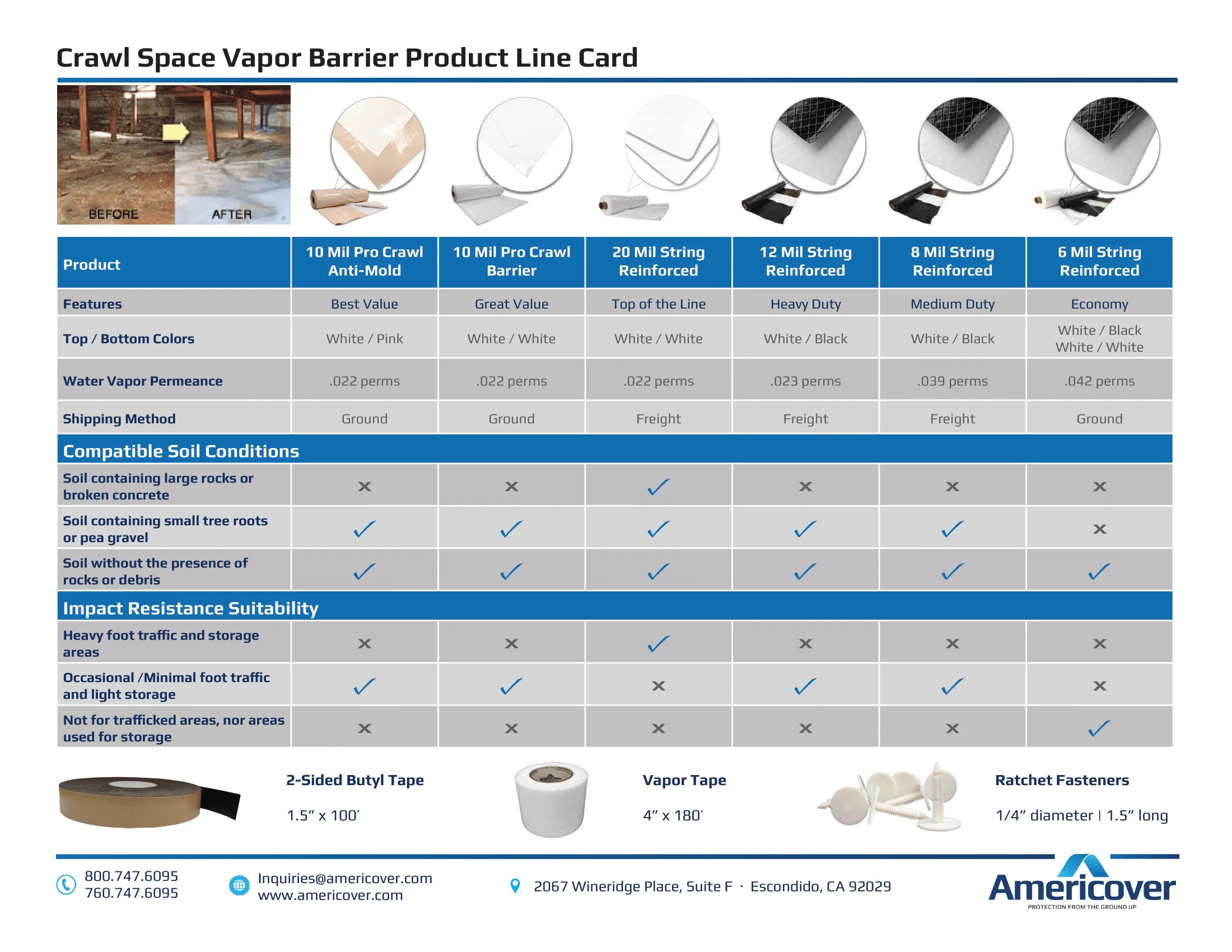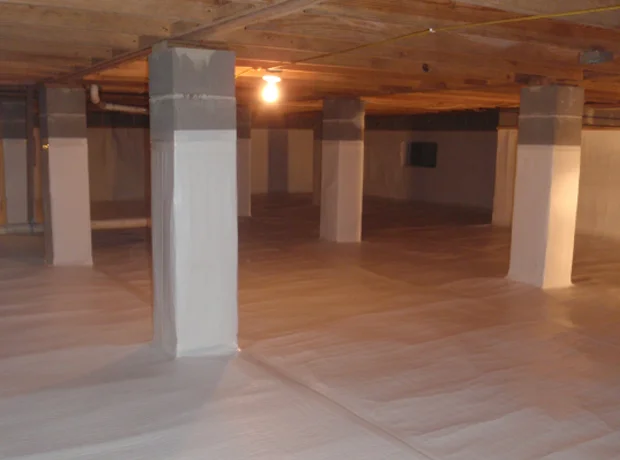
In most cases, crawl space vapor barriers should be at least 12 mils thick poly, but it depends on the floor, how often the crawl space will be entered along with if the crawl space will be used for storage. The minimum 6 mil is inadequate if the floor of the crawl space has rocks, roots or concrete chunks. Below, we will explain everything you need to know about making this choice and how to purchase the right vapor barrier.
Crawl spaces beneath houses are usually vented, meaning they have small openings to let air pass freely between the crawl space and outside. However, this is not the primary source of moisture problems. Moisture is present in the ground soil beneath the house and in general these vents don’t do a good job of circulating air. In humid climates, vented crawl spaces are especially damaging. Moisture-laden air enters the crawl space and condenses into water droplets on cool pipes and concrete walls, which promotes mold, fungus, mildew, and bacteria. Fortunately, vented crawl spaces can be sealed or encapsulated with the proper installation of a crawl space vapor barrier.
What Is A Vapor Barrier?
When applied correctly to your crawl space, a vapor barrier serves as a protective layer between the ground and the interior of your home. Its main purpose is to prevent moisture from seeping into the crawl space, which can lead to structural damage, mold, and even exposure to harmful gasses such as radon.
Related Article: Radon Vapor Barrier: Where Does It Go in a Radon Mitigation System?
Why a Crawl Space Vapor Barrier?
In addition to water vapor and mold prevention, there are significant benefits to using a crawl space vapor barrier. Sealing off your crawl space can prevent rodents, bugs, and other pests from making their way into your home. Moisture creates a hospitable environment for undesirable guests, and if left unaddressed, it can destroy the subfloor of your home — and along with it, the foundation.
Depending on the extent of the damage the cost to clean and/or repair a crawl space can be considerably high, which is why the preventive measure of installing a vapor barrier is the preferred course of action. Sealing an open crawl space with a vapor barrier can also provide significant energy savings – an added plus if you ask us. But not every vapor barrier is built the same, and depending on your unique situation, you may need different levels of mil thickness and perm rating.
What Is Mil Thickness?
Mil thickness is a unit of measurement that determines the durability and puncture resistance of your vapor barrier. A mil is equal to 0.001 inches of thickness. Codes for residential applications often cite a 6 mil (0.006-inch thick) minimum vapor barrier.
Depending on the environment underneath, and the expected level of use of your crawl space, you may warrant different levels of protection. For example, if you’ve got a crawl space that has fine soil underneath, and little to no foot traffic in its anticipated future, a 6 mil vapor barrier may do the trick. However, if you’ve got a lot of large, sharp rocks and think there’s a good chance you’ll be storing things down there or have to maintain equipment located in the crawl space, then a thicker barrier could be a better option due to durability concerns.
Standard Crawl space vapor barrier thicknesses range from 6 mil to 20 mil, with 6 mil being the bare minimum and 20 mil being the most heavy duty and puncture-resistant. There are thicker options available, but not required. Our customers often opt for at least an 8 mil thickness to ensure the longevity of their crawl space vapor barriers, but to get the best recommendation, you should contact our product experts to discuss your specific needs.
What Is A Perm Rating?
Other than the mil thickness, the other important unit of measurement to look for on a vapor barrier is its perm rating. While ‘Mils’ is the measurement of the poly’s thickness, “Perm” represents its permeability to moisture.
The perm rating tells us how readily water vapor will pass through a material. The lower the perm rating, the less permeable that material is. To classify as a vapor barrier, a material must have a perm rating of 0.1 or below. Our vapor barriers that are 6 mils (0.06 perms) and thicker meet this bare minimum, but a thicker material provides a little extra protection along the way.
How Much Does A Crawl Space Vapor Barrier Cost?
The amount you’ll need to spend on a crawl space vapor barrier boils down to four main factors:
Permeability:
Thicker barriers typically have lower permeability, meaning they are less likely to allow moisture to pass through. These also come with a cost, however, with thicker materials being more expensive.
Ground Conditions:
High-traffic crawl spaces may require thicker barriers to withstand wear and tear, especially if you have uneven or rocky soil underneath the vapor barrier. Stronger materials come with a cost, but in our experience, it’s well worth the investment.
Virgin Vs. Regrind:
Not all polys of equal mil thickness and perm rating are built the same. Oftentimes, the type of poly that’s stocked at local hardware stores may be non-reinforced or made from recycled “regrind” materials. Regrind poly can contain impurities such as dirt or other contaminants, compromising its quality and longevity. Ultimately, contacting one of our product experts to determine your application’s needs is what’s best for your crawl space.
Total Area:
Of course, we all want to use the highest-quality materials everywhere in our home, but the truth is that the larger your crawl space is, the more you’re going to have to pay. Though going with a thicker vapor barrier generally comes at a higher cost upfront, it’ll also offer greater long-term value and durability. To save cost without sacrificing durability, you can try opting for a thinner poly, such as a 6 mil or an 8 mil, on the walls of the crawl space while using a thicker poly on the floor.
Related Article: How Much Does a Crawl Space Vapor Barrier Cost?
Choosing The Right Crawl Space Vapor Barrier
Every project is unique, and we recognize that not everyone is going to warrant the same solution. Learn more about which vapor barriers are most suitable for your situation by using our product comparison chart below:
Generally, if the crawl space is going to be entered regularly for maintenance, or if items are going to be stored in the crawl space, it is a good idea to get a thicker poly starting at 12 mils. The minimum 6 mil is inadequate if the floor of the crawl space has rocks, roots or concrete chunks. Remember that one tear or puncture in your vapor barrier will allow moisture to pass through and render the barrier less effective.
We know this is a lot to consider – but the team at Americover is here to help. If you have any questions at all, please don’t hesitate to reach out to our vapor barrier experts today at 760-388-6294.
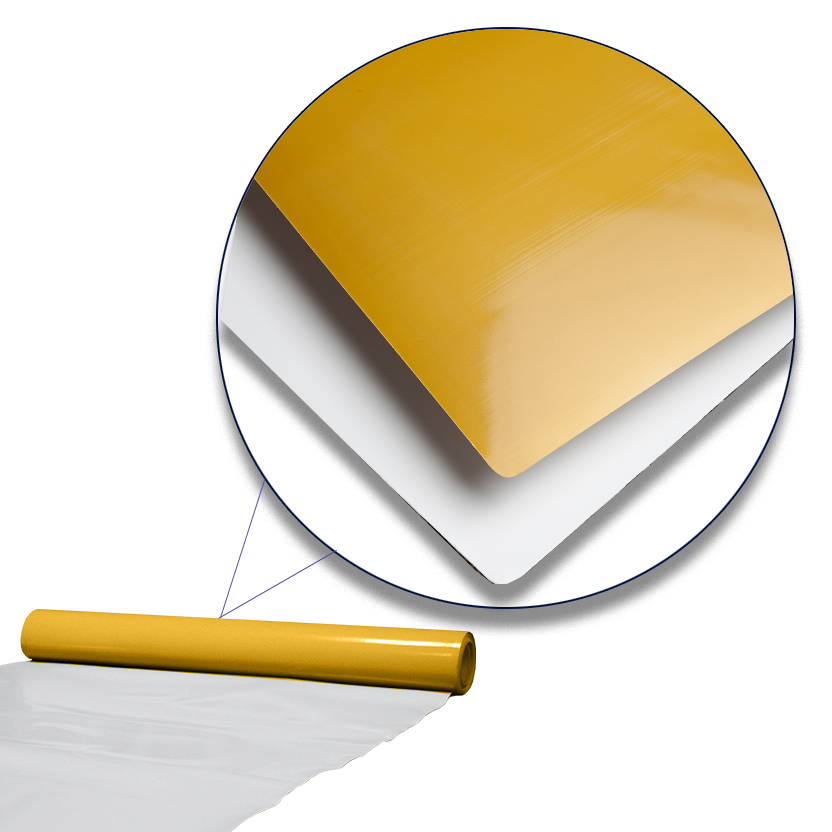
🔗 VaporBlock® Plus™ 20 Mil Vapor and Gas Barrier
One of the strongest vapor and gas barriers on the market, VaporBlock® Plus™ is a 20 mil retarder that exceeds ASTM E-1745 Class A, B, and C standards and is engineered specifically to block radon and other harmful soil gases in critical applications.
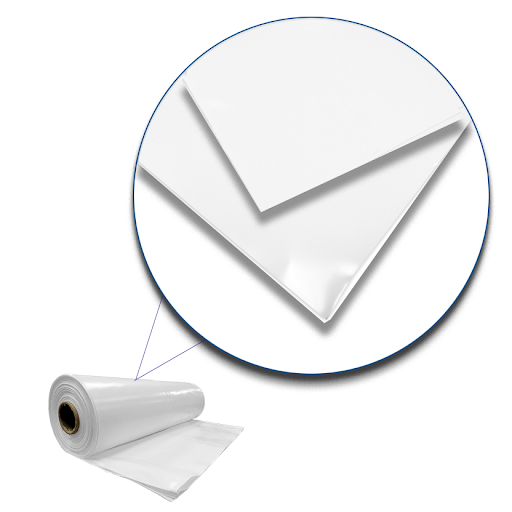
🔗 Pro Crawl™ Barrier – 10 Mil
Engineered for crawl space encapsulation, Pro Crawl™ is a 10 mil reinforced Class 1 vapor retarder that balances strength and flexibility—perfect for moisture control over dirt floors and uneven surfaces.
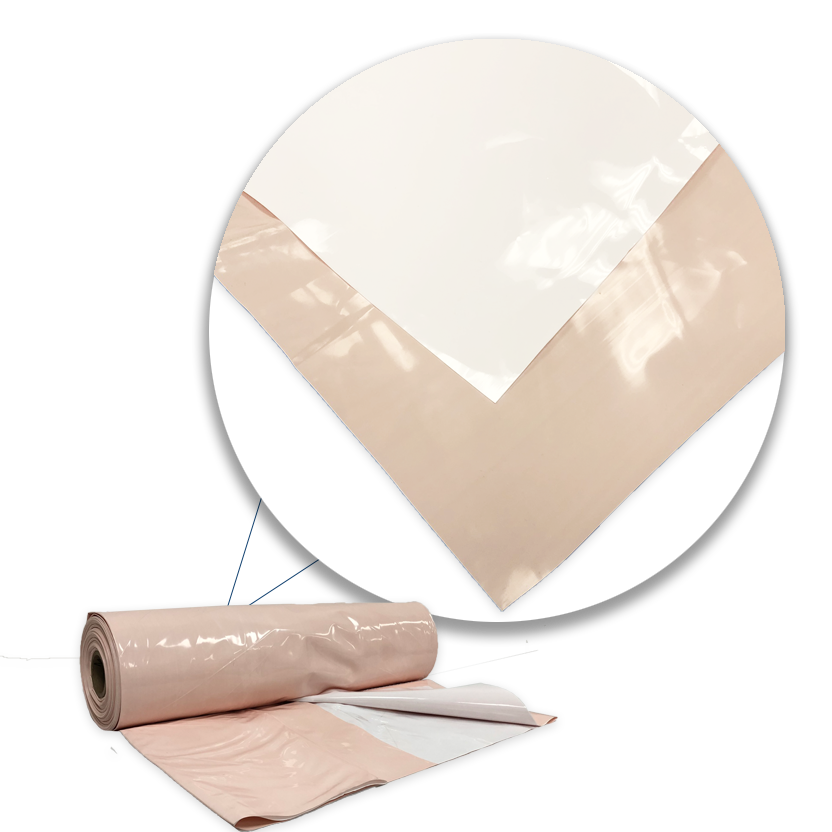
🔗 Pro Crawl™ Anti-Mold Vapor Barrier – 10 Mil
Protect your crawl space from more than just moisture. Pro Crawl™ Anti-Mold is a 10 mil Class 1 vapor retarder with built-in mold prevention, ideal for high-humidity environments and long-term protection.
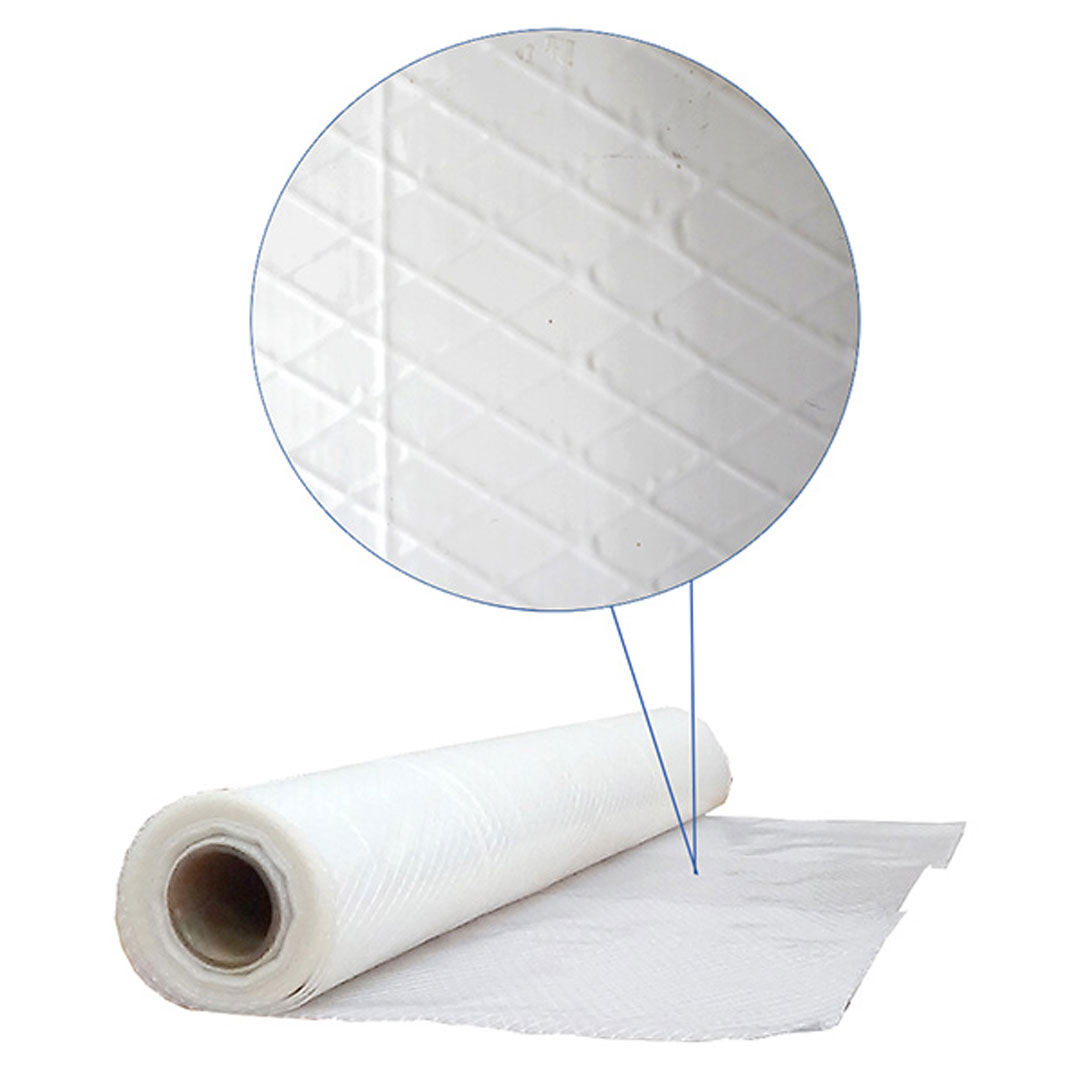
🔗 20 Mil Dura Skrim® Reinforced Plastic Sheeting
Designed for the most demanding applications, 20 Mil Dura Skrim® delivers unmatched durability with multi-layer reinforcement, making it ideal for under-slab vapor barriers, liners, and heavy-duty construction projects.
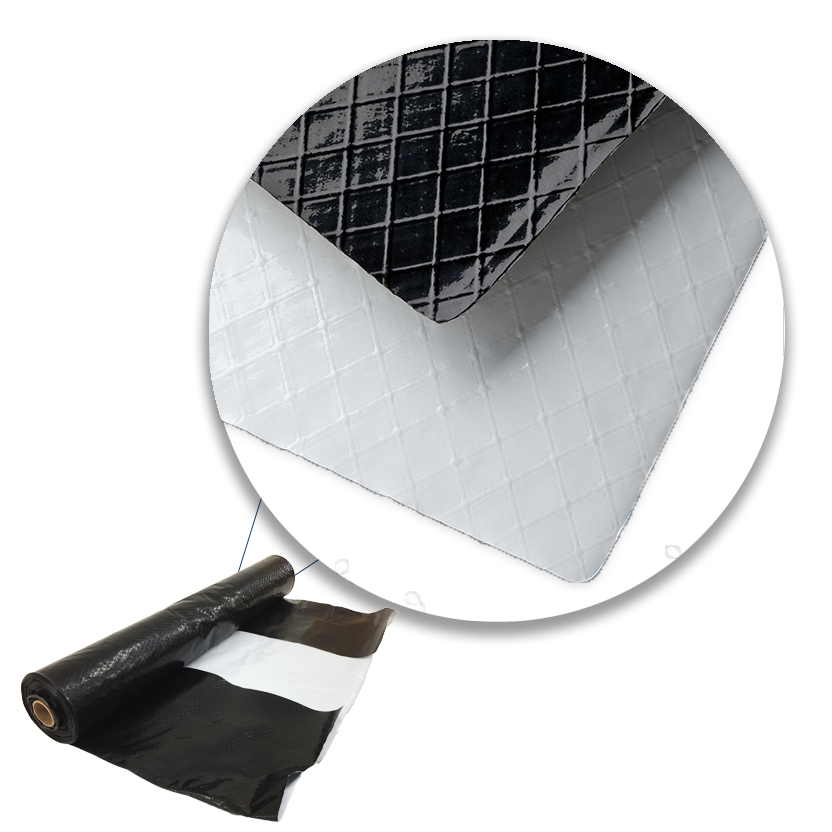
🔗 12 Mil Dura Skrim® Reinforced Plastic Sheeting
Built for strength without the bulk, 12 Mil Dura Skrim® offers reliable puncture resistance and reinforcement, making it a go-to solution for crawl spaces, temporary enclosures, and light construction use.
Seal the Job with Vapor Barrier Tape
Tape is an essential part of the vapor barrier installation process, used to overlap panels and seal the material to walls, piers, and other structural elements. Complete your crawl space encapsulation with the right tape for a long-lasting, airtight seal.
Americover offers a selection of high-performance tapes specifically designed for use with vapor barriers—ideal for seaming, securing edges, and bonding to foundation surfaces. Whether you need an aggressive adhesive for tough substrates or a flexible option for panel overlaps, our tapes help ensure your crawl space stays protected from moisture, radon, and mold.
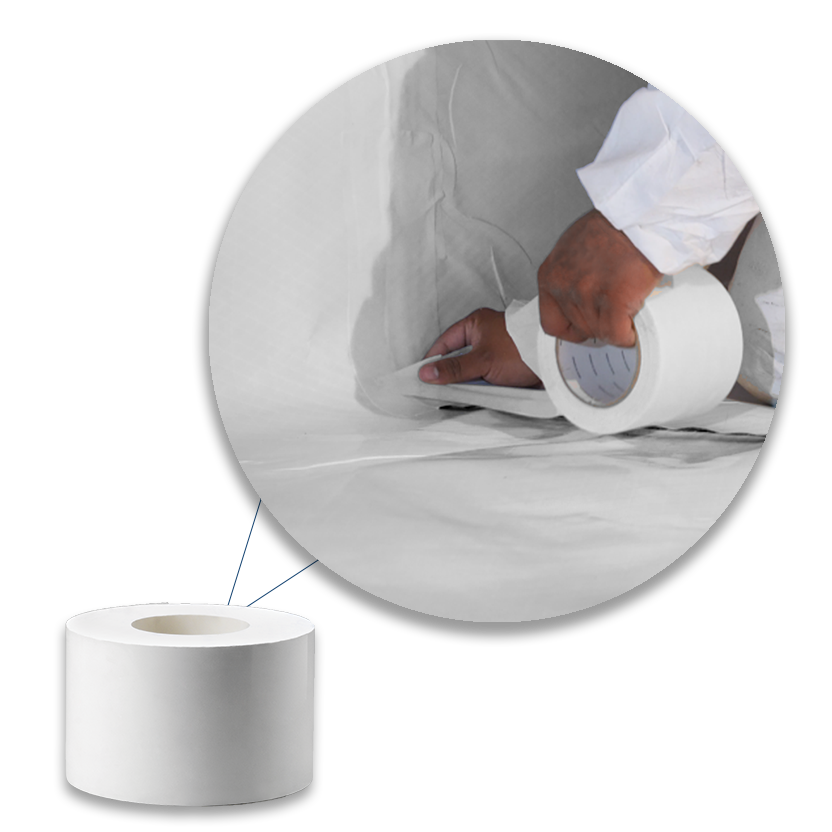
🔗 Vapor Tape
Designed for use with polyethylene vapor barriers, Vapor Tape is a single-sided, durable adhesive tape ideal for seaming and securing overlaps during crawl space encapsulation. Its aggressive bond ensures a tight seal on clean surfaces, helping to prevent moisture intrusion and maintain barrier integrity.
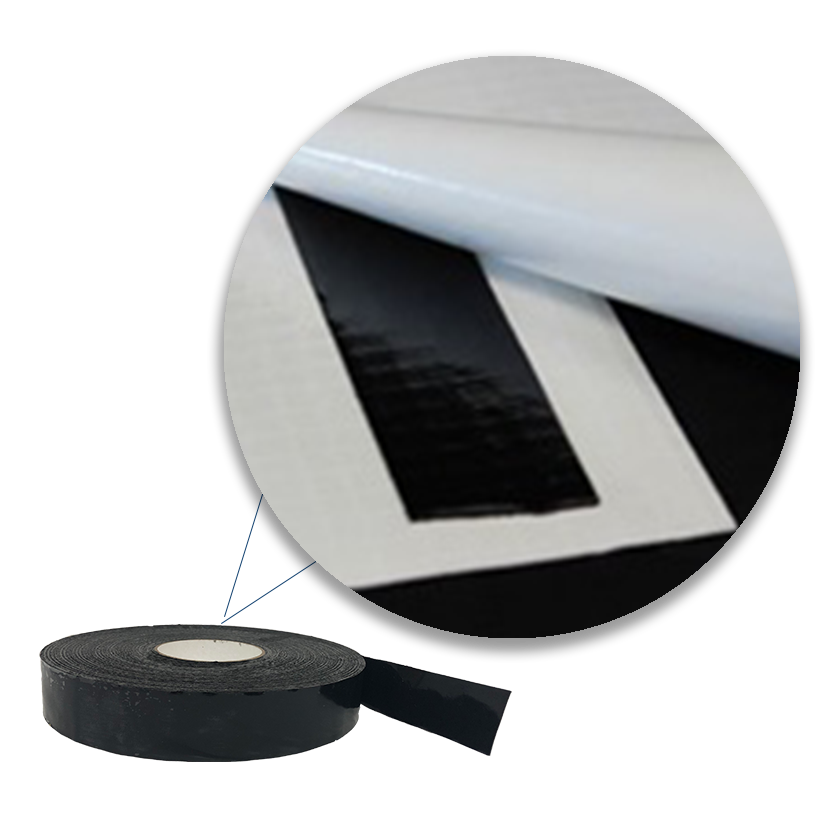
🔗 2-Sided Butyl Tape
2-Sided Butyl Tape provides a watertight, flexible seal between vapor barriers and foundation walls, piers, or footings. Its double-sided adhesive grips both surfaces, making it the go-to choice for areas that demand strong, lasting adhesion—even in challenging conditions.
Find The Right Crawl Space Vapor Barrier With Americover
Do you have questions about deciding which crawl space vapor barrier is right for your project?
For Contractors and Distributors
We offer special pricing, volume discounts, short lead times, and a dedicated account manager who will work with you to get exactly what you need. If you would like to speak with a representative, contact us at 760.548.4102 or fill out the form below.

